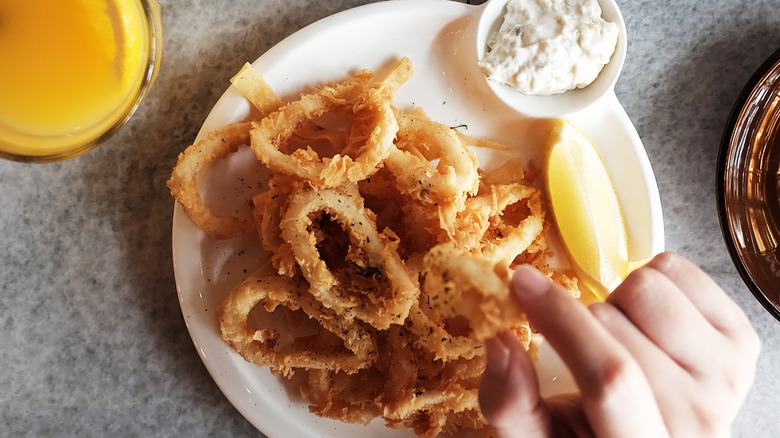Is Imitation Calamari Really Made From Pig Rectums?
Imitation seafood has existed for years. Imitation crab, for example, came out in the 1970s. Some imitation seafood, like crab, have been so well-developed over the years that you'd want to eat it all in one sitting. However, others, like imitation calamari, leave consumers questioning what they're actually eating. What exactly are we eating when we eat imitation calamari?
Calamari is fried squid typically cut into small rings from the squid's body and tentacles. It has a chewy texture with a mild, nutty taste. Once breaded and fried or paired with marinara sauce, calamari doesn't taste much like fish at all. An unfortunate rumor has been circulating that claims imitation calamari is actually made from pig rectum. But, like the infamous tales about Taco Bell's meat source, it's just a rumor.
According to The USDA's Food Safety and Inspection Service (FSIS), any food item containing pork must be clearly labeled as such and cannot legally be mislabeled or sold under a different species' name like squid or calamari. So there's no need to worry about the next time you want imitation calamari. As for what they're actually made of, food manufacturers aren't exactly forthcoming which leaves all of us consumers to simply speculate.
Where did these rumors come from?
On January 11, 2013, " This American Life," a popular radio show, released an episode about a tip it had received claiming imitation calamari was made from pig intestines. Though the story was later cleared up by Slate after following up with the show's host, Ben Calhoun, the rumors had already gained traction. Much like a game of telephone, the implied story of pig rectum being the main component of imitation calamari spread across popular forums like Reddit and has continued to this day on TikTok.
Redditors speculated the rumors came from environmental groups that may have amplified claims, particularly in response to the Safety and Fraud Enforcement for Seafood Act which had recently been introduced. Some suggested these speculations stemmed from fears over how seafood was processed and distributed. PETA and other environmental groups latched onto this idea, capitalizing on ongoing concerns about fraud in seafood handling.
Distrust in large food corporations (a social phenomenon which isn't helped by recalls at McDonald's due to E. coli outbreaks in its Quarter Pounder or its contaminated onions) has likely helped fuel the longevity of these rumors. Although, with so many food safety scares over the years and a well-documented history of seafood fraud, it's no wonder many consumers remain skeptical.

